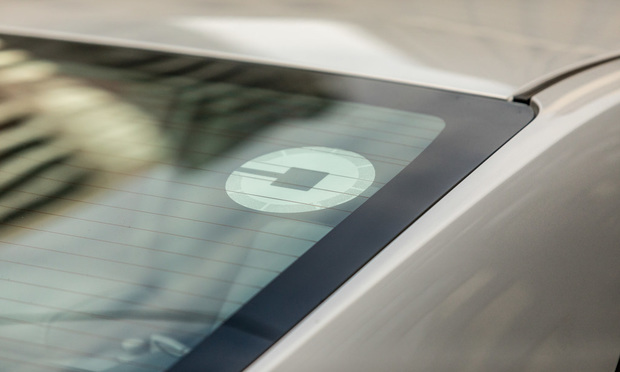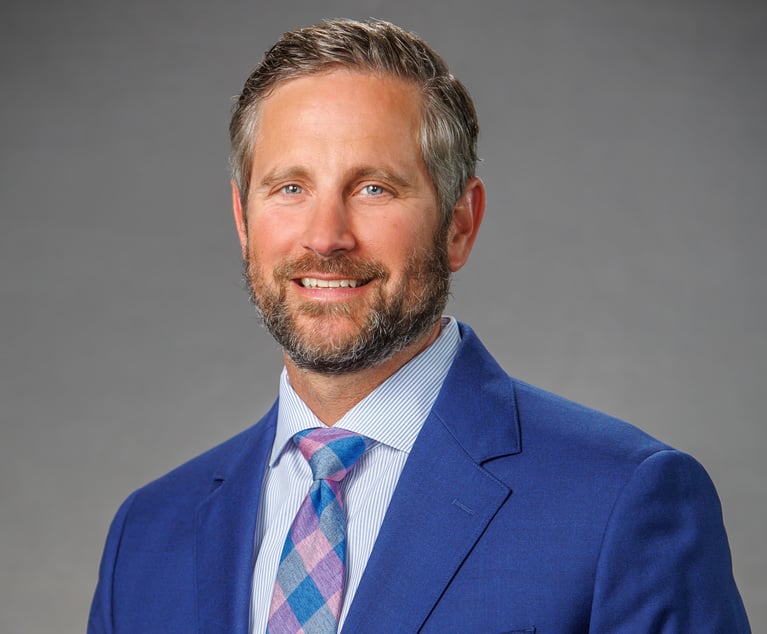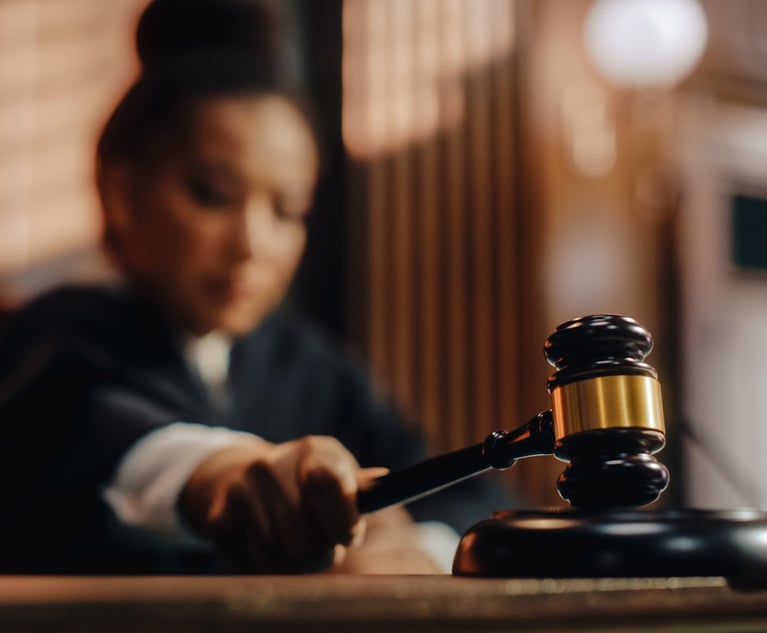Uber Limo Drivers Are Contractors, Not Employees, Federal Judge Rules
Uber limo drivers are not employees under the Fair Labor Standards Act, a federal judge has ruled, handing the ride share giant a win against drivers who sued the company for allegedly failing to meet minimum wage and overtime requirements.
April 13, 2018 at 01:40 PM
4 minute read
 Uber car. Photo: Jason Doiy/ALM
Uber car. Photo: Jason Doiy/ALM Uber limo drivers are not employees under the Fair Labor Standards Act, a federal judge has ruled, handing the ride share giant a win against drivers who sued the company for allegedly failing to meet minimum wage and overtime requirements.
U.S. District Judge Michael Baylson of the Eastern District of Pennsylvania ruled Wednesday that UberBLACK drivers are independent contractors, rather than actual employees of the ride share company, and granted Uber summary judgment dismissing the case. According to Baylson, the ruling in Razak v. Uber Technologies marks the first time a court has granted summary judgment on the issue under the FLSA.
Baylson's opinion focused on criteria enumerated in the U.S. Court of Appeals for the Third Circuit's 1985 ruling in Donovan v. DialAmerica Marketing for determining whether a worker is an employee under the FLSA, and found that most factors indicated Uber limo drivers are independent contractors.
For instance, he said the fact that drivers can hire subcontractors, are paid through their own businesses and are free to determine their own working hours indicated the drivers had significant control over their work, which weighed heavily in favor of finding that the drivers were independent contractors.
“Uber places no restrictions on drivers' ability to engage in personal activities while online, and plaintiffs here, in fact, engaged in a range of personal activities while online,” Baylson said. “The undisputed facts in the record reflect that, while online, plaintiffs, inter alia, accepted rides from private clients, slept, did personal errands, smoked cigarettes, took personal phone calls, rejected trips because they were tired, and conducted business for their independent transportation companies.”
The ruling comes as courts across the country are grappling with how to apply traditional business and legal concepts to the emerging gig economy.
Sacks Weston Diamond attorney Jeremy Abay, who represented the drivers, said he plans to appeal the decision to the Third Circuit, which positions the case for the nation's first circuit court opinion on the issue.
“We have consistently stated throughout this case that employment status is not an issue that is properly determined by summary judgment, and we expect the Third Circuit to agree with us,” he said. “Donovan remains the controlling case in the Third Circuit, and it was published in 1985, so we'll be curious to see if the Third Circuit alters or otherwise updates the Donovan test so it can be more aptly applied in gig economy cases.”
Matthew Hank of Littler Mendelson represented Uber. A spokesman for the company said in an emailed statement, “We are pleased with the decision.”
In Razak, the plaintiffs filed a prospective class action suit alleging Uber violated the FLSA overtime requirements and the minimum wage. The issue about whether the drivers are employees or independent contractors emerged as a central issue in the litigation.
Among other things, the drivers, who make themselves available to pick up riders through Uber's smartphone app, contended that the company exercised significant control over them each time they were signed into the ride-hailing app, such as kicking drivers off the app if they failed to accept a certain amount of rides, or deactivating drivers who fell below certain customer satisfaction ratings. But Baylson said that just because the company exercised some control did not mean the drivers were employees.
“Given the unique business model which transportation network companies, such as Uber, have created, and their applicability to UberBLACK drivers, the fact that Uber does exercise some control when UberBLACK drivers are online does not convert UberBLACK drivers into employees,” Baylson said. “The court likens this situation to a carpenter, or a plumber, who is engaged to complete a renovation project for a homeowner.”
This content has been archived. It is available through our partners, LexisNexis® and Bloomberg Law.
To view this content, please continue to their sites.
Not a Lexis Subscriber?
Subscribe Now
Not a Bloomberg Law Subscriber?
Subscribe Now
NOT FOR REPRINT
© 2025 ALM Global, LLC, All Rights Reserved. Request academic re-use from www.copyright.com. All other uses, submit a request to [email protected]. For more information visit Asset & Logo Licensing.
You Might Like
View All

'Discordant Dots': Why Phila. Zantac Judge Rejected Bid for His Recusal
3 minute read
Phila. Court System Pushed to Adapt as Justices Greenlight Changes to Pa.'s Civil Jury Selection Rules
5 minute read
Pa. Appeals Court: Trial Judge Dismissed Med Mal Claims Without Giving Plaintiffs Proper Time to Fight Back
4 minute readTrending Stories
- 1South Florida Attorney Charged With Aggravated Battery After Incident in Prime Rib Line
- 2'A Death Sentence for TikTok'?: Litigators and Experts Weigh Impact of Potential Ban on Creators and Data Privacy
- 3Bribery Case Against Former Lt. Gov. Brian Benjamin Is Dropped
- 4‘Extremely Disturbing’: AI Firms Face Class Action by ‘Taskers’ Exposed to Traumatic Content
- 5State Appeals Court Revives BraunHagey Lawsuit Alleging $4.2M Unlawful Wire to China
Who Got The Work
J. Brugh Lower of Gibbons has entered an appearance for industrial equipment supplier Devco Corporation in a pending trademark infringement lawsuit. The suit, accusing the defendant of selling knock-off Graco products, was filed Dec. 18 in New Jersey District Court by Rivkin Radler on behalf of Graco Inc. and Graco Minnesota. The case, assigned to U.S. District Judge Zahid N. Quraishi, is 3:24-cv-11294, Graco Inc. et al v. Devco Corporation.
Who Got The Work
Rebecca Maller-Stein and Kent A. Yalowitz of Arnold & Porter Kaye Scholer have entered their appearances for Hanaco Venture Capital and its executives, Lior Prosor and David Frankel, in a pending securities lawsuit. The action, filed on Dec. 24 in New York Southern District Court by Zell, Aron & Co. on behalf of Goldeneye Advisors, accuses the defendants of negligently and fraudulently managing the plaintiff's $1 million investment. The case, assigned to U.S. District Judge Vernon S. Broderick, is 1:24-cv-09918, Goldeneye Advisors, LLC v. Hanaco Venture Capital, Ltd. et al.
Who Got The Work
Attorneys from A&O Shearman has stepped in as defense counsel for Toronto-Dominion Bank and other defendants in a pending securities class action. The suit, filed Dec. 11 in New York Southern District Court by Bleichmar Fonti & Auld, accuses the defendants of concealing the bank's 'pervasive' deficiencies in regards to its compliance with the Bank Secrecy Act and the quality of its anti-money laundering controls. The case, assigned to U.S. District Judge Arun Subramanian, is 1:24-cv-09445, Gonzalez v. The Toronto-Dominion Bank et al.
Who Got The Work
Crown Castle International, a Pennsylvania company providing shared communications infrastructure, has turned to Luke D. Wolf of Gordon Rees Scully Mansukhani to fend off a pending breach-of-contract lawsuit. The court action, filed Nov. 25 in Michigan Eastern District Court by Hooper Hathaway PC on behalf of The Town Residences LLC, accuses Crown Castle of failing to transfer approximately $30,000 in utility payments from T-Mobile in breach of a roof-top lease and assignment agreement. The case, assigned to U.S. District Judge Susan K. Declercq, is 2:24-cv-13131, The Town Residences LLC v. T-Mobile US, Inc. et al.
Who Got The Work
Wilfred P. Coronato and Daniel M. Schwartz of McCarter & English have stepped in as defense counsel to Electrolux Home Products Inc. in a pending product liability lawsuit. The court action, filed Nov. 26 in New York Eastern District Court by Poulos Lopiccolo PC and Nagel Rice LLP on behalf of David Stern, alleges that the defendant's refrigerators’ drawers and shelving repeatedly break and fall apart within months after purchase. The case, assigned to U.S. District Judge Joan M. Azrack, is 2:24-cv-08204, Stern v. Electrolux Home Products, Inc.
Featured Firms
Law Offices of Gary Martin Hays & Associates, P.C.
(470) 294-1674
Law Offices of Mark E. Salomone
(857) 444-6468
Smith & Hassler
(713) 739-1250





